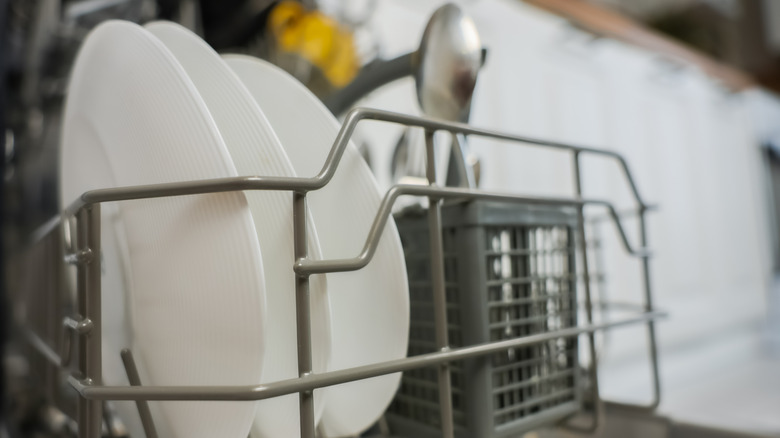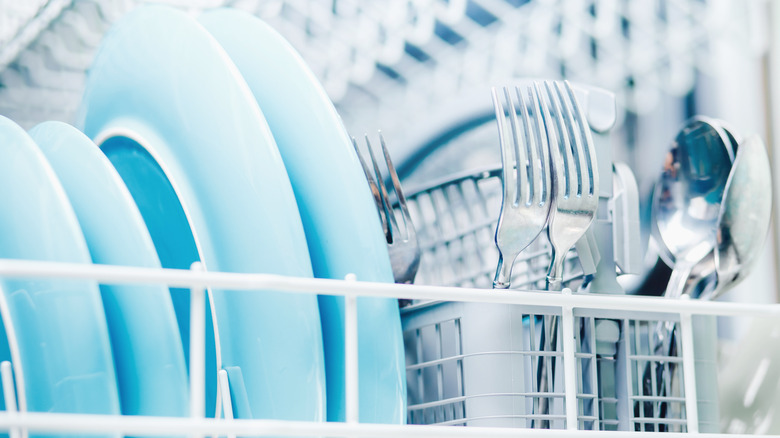Read This Before Investing In A Countertop Dishwasher
We may receive a commission on purchases made from links.
Moving into a new house or apartment without a dishwasher can be a bummer — and it's even a non-negotiable for some. Often cited as one of the least favorite household chores, washing dishes by hand is time-consuming. However, installing a dishwasher into a kitchen is no easy task, and sometimes, it's simply out of the question. There's a tiny solution to make your life a lot easier: the countertop dishwasher.
A countertop dishwasher is exactly what it sounds like; it's a small cube that sits on the counter and washes dishes by pulling water from a connection to the kitchen sink (although some models allow you to instead load the water manually). Countertop dishwashers need to be plugged into a standard outlet for energy and empty the dirty water back into the kitchen sink. These machines do not require permanent installation like a traditional dishwasher, so they are a great option for short-term rentals, dorm rooms, and small apartments. For those living life on the road, countertop dishwashers also function in RVs.
But how many dishes can it hold? Most countertop dishwasher models hold around four to six place settings, making them perfect for an individual, couples, or small households. Countertop dishwashers follow the standard loading rules of the average dishwasher — so you will still need to avoid the typical dishwasher loading mistakes. Also, the dishwasher filter must be checked and cleared as normal, and built-up grime can be easily cleaned with vinegar and baking soda.
Benefits of a countertop dishwasher
One of the biggest advantages of a countertop dishwasher is convenience. Hand-washing dishes can be time-consuming and labor-intensive. In fact, if you choose to hand wash, this roughly equates to spending 10 whole days per year washing dishes. Countertop dishwashers cut down on labor and time, as they only need to be loaded and unloaded.
These machines are also more water-efficient compared to hand-washing. This is especially true if you tend to leave the faucet running in between each dish. The small countertop models use less water and electricity compared to the traditional dishwashers and, therefore, can lower the cost of bills. Countertop dishwashers can also be versatile, with different types of washing and drying cycles in some models. They can also handle daily dish loads, making them a great option for individuals or small households that don't accumulate a large number of dirty dishes.
Compared to a large, standard dishwasher, the countertop version is more affordable. Most models cost around $270 to $450; while some traditional dishwasher models can be purchased for under $500, most are between $500 to $1800 new. Countertop dishwashers can be conveniently bought on Amazon; two highly rated options are the COMFEE and the Hava.
Downsides to consider before buying
Countertop dishwashers are a smart choice in many situations, but they do have some limitations. The small loading capacity means they aren't ideal for large households and families. A built-in dishwasher is a better choice for handling a lot of dirty dishes, as they hold between 12 and 16 place settings per load, compared to the countertop model's four to six. Furthermore, even though these are small appliances, they do require counter space which can be an issue in cramped kitchens. On top of this, the countertop dishwashers that connect directly to the kitchen sink block access to your faucet while the cycle is running. This could make multitasking more difficult if you wanted to cook or clean.
Another downside is that while full-sized dishwashers can handle large items like pots and pans, the countertop dishwasher simply may not have the space for larger items. It's best practice to scrape food off dishes before loading them into whatever size dishwasher you have; this is especially true for the small models, which do not have food grinders like some larger traditional dishwashers. While the countertop models have food filters, it's possible they could get clogged quickly if the dishes are not pre-rinsed before loading.


